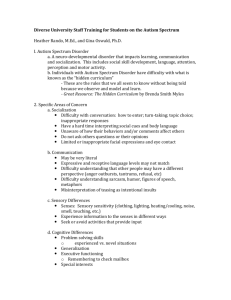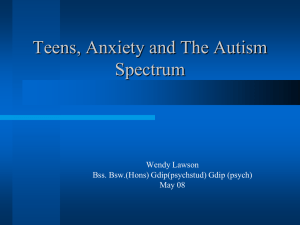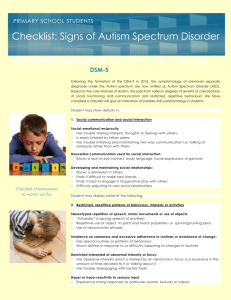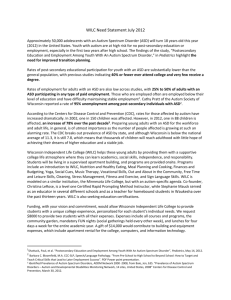Interventions for adults with autism spectrum disorders
advertisement
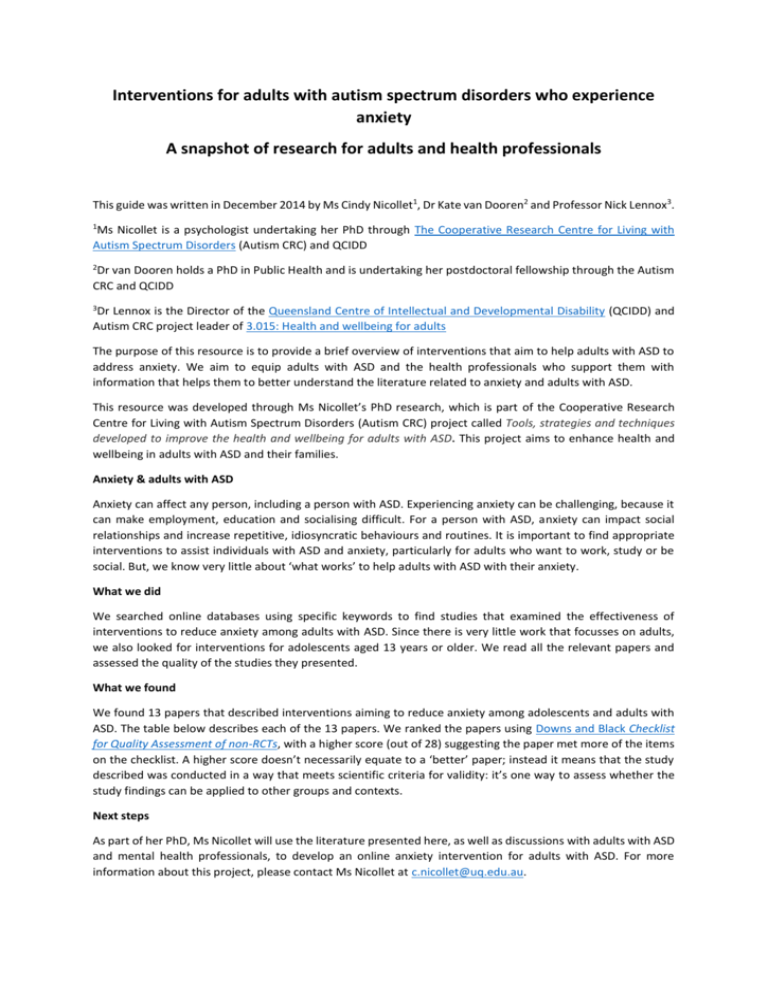
Interventions for adults with autism spectrum disorders who experience anxiety A snapshot of research for adults and health professionals This guide was written in December 2014 by Ms Cindy Nicollet1, Dr Kate van Dooren2 and Professor Nick Lennox3. 1 Ms Nicollet is a psychologist undertaking her PhD through The Cooperative Research Centre for Living with Autism Spectrum Disorders (Autism CRC) and QCIDD 2 Dr van Dooren holds a PhD in Public Health and is undertaking her postdoctoral fellowship through the Autism CRC and QCIDD 3 Dr Lennox is the Director of the Queensland Centre of Intellectual and Developmental Disability (QCIDD) and Autism CRC project leader of 3.015: Health and wellbeing for adults The purpose of this resource is to provide a brief overview of interventions that aim to help adults with ASD to address anxiety. We aim to equip adults with ASD and the health professionals who support them with information that helps them to better understand the literature related to anxiety and adults with ASD. This resource was developed through Ms Nicollet’s PhD research, which is part of the Cooperative Research Centre for Living with Autism Spectrum Disorders (Autism CRC) project called Tools, strategies and techniques developed to improve the health and wellbeing for adults with ASD. This project aims to enhance health and wellbeing in adults with ASD and their families. Anxiety & adults with ASD Anxiety can affect any person, including a person with ASD. Experiencing anxiety can be challenging, because it can make employment, education and socialising difficult. For a person with ASD, anxiety can impact social relationships and increase repetitive, idiosyncratic behaviours and routines. It is important to find appropriate interventions to assist individuals with ASD and anxiety, particularly for adults who want to work, study or be social. But, we know very little about ‘what works’ to help adults with ASD with their anxiety. What we did We searched online databases using specific keywords to find studies that examined the effectiveness of interventions to reduce anxiety among adults with ASD. Since there is very little work that focusses on adults, we also looked for interventions for adolescents aged 13 years or older. We read all the relevant papers and assessed the quality of the studies they presented. What we found We found 13 papers that described interventions aiming to reduce anxiety among adolescents and adults with ASD. The table below describes each of the 13 papers. We ranked the papers using Downs and Black Checklist for Quality Assessment of non-RCTs, with a higher score (out of 28) suggesting the paper met more of the items on the checklist. A higher score doesn’t necessarily equate to a ‘better’ paper; instead it means that the study described was conducted in a way that meets scientific criteria for validity: it’s one way to assess whether the study findings can be applied to other groups and contexts. Next steps As part of her PhD, Ms Nicollet will use the literature presented here, as well as discussions with adults with ASD and mental health professionals, to develop an online anxiety intervention for adults with ASD. For more information about this project, please contact Ms Nicollet at c.nicollet@uq.edu.au. References You can find these papers online. Those marked with a * are available for free to download by clicking on the title and following the URL. Cardaciotto, L., & Herbert, J. D. (2004). Cognitive Behavior Therapy for Social Anxiety Disorder in the Context of Asperger's Syndrome: A Single-Subject Report. Cognitive and Behavioral Practice, 11, 75-81. *Freitag, C. M., Cholemkery, H., Elsuni, L., Kroeger, A. K., Bender, S., Kunz, C. U., & Kieser, M. (2013). The group-based social skills training SOSTA-FRA in children and adolescents with high functioning autism spectrum disorder--study protocol of the randomised, multi-centre controlled SOSTA--net trial. Trials, 14(6), 12. doi: 10.1186/1745-6215-14-6 *Kiep, M., Spek, A. A., & Hoeben, L. (2014). Mindfulness-based therapy in adults with an autism spectrum disorder: Do treatment effects last? Mindfulness, 8. doi: 10.1007/s12671-014-0299-x *Langdon, P. E., Murphy, G. H., Wilson, E., Shepstone, L., Fowler, D., Heavens, D., . . . Russell, A. (2013). Asperger syndrome and anxiety disorders (PAsSA) treatment trial: A study protocol of a pilot, multicentre, single-blind, randomised crossover trial of group cognitive behavioural therapy. British Medical Journal Open, 3(7), 6. doi: 10.1136/bmjopen-2013-003449 *McGillivray, J. A., & Evert, H. T. (2014). Group Cognitive Behavioural Therapy Program Shows Potential in Reducing Symptoms of Depression and Stress Among Young People with ASD. Journal of Autism & Developmental Disorders, 11. doi: 10.1007/s10803-014-2087-9 *Ozsivadjian, A., & Knott, F. (2011). Anxiety problems in young people with autism spectrum disorder: a case series. Clin Child Psychol Psychiatry, 16(2), 203-214. doi: 10.1177/1359104511404749 *Reaven, J., Blakeley-Smith, A., Leuthe, E., Moody, E., & Hepburn, S. (2012). Facing your fears in adolescence: cognitive-behavioral therapy for high-functioning autism spectrum disorders and anxiety. Autism Res Treat, 2012, 13. doi: 10.1155/2012/423905 Russell, A. J., Jassi, A., Fullana, M. A., Mack, H., Johnston, K., Heyman, I., Mataix‐Cols, D. (2013). Cognitive behavior therapy for comorbid obsessive-compulsive disorder in high-functioning autism spectrum disorders: A randomized controlled trial. Depress Anxiety, 30(8), 697-708. *Spek, A. A., Ham, N. C., & Nyklícek, I. (2013). Mindfulness-based therapy in adults with an autism spectrum disorder: a randomized controlled trial. Res Dev Disabil, 34(1), 246-253. doi: 10.1016/j.ridd.2012.08.009 Weiss, J. A., & Lunsky, Y. (2010). Group cognitive behaviour therapy for adults with Asperger syndrome and anxiety or mood disorder: a case series. Clinical Psychology and Psychotherapy, 17(5), 438-446. doi: 10.1002/cpp.694 *White, S., Ollendick, T., Albano, A., Oswald, D., Johnson, C., Southam-Gerow, M., Scahill, L. (2013). Randomized Controlled Trial: Multimodal Anxiety and Social Skill Intervention for Adolescents with Autism Spectrum Disorder. Journal of Autism & Developmental Disorders, 43(2), 382-394. doi: 10.1007/s10803-012-1577-x *White, S. W., Ollendick, T., Scahill, L., Oswald, D., & Albano, A. M. (2009). Preliminary efficacy of a cognitivebehavioral treatment program for anxious youth with autism spectrum disorders. J Autism Dev Disord, 39(12), 1652-1662. doi: 10.1007/s10803-009-0801-9 Wright, K. P. (2013). Cognitive behavioural therapy for anxiety in a man with autism spectrum disorder, intellectual disability, and social phobia. Advances in Mental Health and Intellectual Disabilities, 7(5), 284-292. doi: 10.1108/AMHID-06-2013-0040 Interventions aiming to reduce anxiety among adolescents and adults with ASD (presented in alphabetical order) Author, Year Country Methods N Age Outcome reported Quality Assessment Score Out of 28 Cardaciatto & Herbert 2004 USA 14 weeks of individual Cognitive Behavioural Therapy (CBT) N = 1 (male) 23 years Consistently reported decreases in social anxiety and depression throughout course of treatment Freitag et al. 2013 Germany Randomised controlled trial N = 220 -- Study protocol only Kiep et al. 2014 The Netherlands Pre-post intervention – Mindfulness-based therapy N = 50 (16 female) Males (mean = 42.1 years); Females (mean = 37.9 years) Significant positive effects of intervention following completion of treatment, and carried through over 9 weeks after completing treatment Langdon et al. 2013 UK Study protocol - randomised, single-blind cross over trial. 24 weekly, 1 hour sessions N = 36 16–65 years Study protocol only N = 32 (9 female) 15–25 years Participants who were initially symptomatic reported significantly lower depression and stress scores on the DASS in comparison to waitlist. There was no significant change in anxiety-related symptoms. The benefits were maintained at 3 and 9 month followup. 18 N = 2, male (Alfie 14 years; Alfie – no change in parental or self-report measures in terms of stress and anxiety. Still met criteria for Generalised Anxiety Disorder (GAD) 11 12-highly structured, manualised, weekly group-based social skills training 5 training groups, 9 weekly sessions of 2½ hours duration 8 Study protocol only 19 Study protocol only Initially 3 one-to-one sessions followed by 21 group CBT sessions McGillivray & Evert 2014 Australia Quasi-experimental design - according to alternate order of enrolment, the participants were allocated either to treatment group or waitlist control Think well, feel well, be well program, over 9 weeks, 2 hour duration Ozsivadjian & Knott 2011 UK Case series Standard CBT treatment, adapted to take into account of the neuropsychological features of ASD Reaven et al. 2012 USA Quasi-experimental design Russell et al. 2013 UK Spek et al. 2013 The Netherlands Randomised controlled trial Weiss & Lunsky 2010 Canada Case series White et al. 2009 USA David – 15 years) David – OCD behaviour reduced and returned upon mutual termination of therapy N = 24 13–18 years Significant reductions in anxiety severity and interference post-treatment, with low rates of anxiety maintained at 3-month follow-up 18 N = 46 14–65 years Both treatments produced a significant reduction in OCD symptoms 22 N = 42 18–65 years Significant reduction in depression, anxiety, and rumination in the intervention group 23 N = 3 (1 female) 18–60 years The 12 week group demonstrated promise in addressing symptoms of anxiety 15 N = 2 (1 female) (Todd -14 years; Jodi – 14 years) Todd – no longer met diagnostic criteria for Social Phobia. At 6-month follow-up Social Phobia remained non-clinical 16 N = 30 12–17 years Decline in anxiety symptoms, but was not statistically significant 21 N = 1 (male) 19 years Step-wise reduction in anxiety for participant 16 Facing Your Fears - Adolescent Version: 14, 90 minute sessions, conducted with parents in large and small group formats Randomised controlled trial CBT for OCD or anxiety management (control group) Modified Mindfulness-based Therapy) protocol: 9 weekly sessions of 2½ hours duration. Participants were instructed to practice 4060 minutes of meditation daily, six days a week 12 weekly, 1 hour sessions based on the structure and information provided in the Mind over Mood workbook Case series Multi-component Integrated Treatment - manual-based intervention targeting anxiety and social competence White et al. 2013 USA Wright 2013 UK Randomised controlled trial 14-week intervention – individual therapy (up to 13 sessions), group therapy (skills practice, 7 sessions), and parent education and coaching (after each individual session) A-B single case design – baseline assessment (A), and intervention phase (B) Jodi – Based on father’s report at 6-month follow-up, continued to demonstrate significantly less impairment due to anxiety


